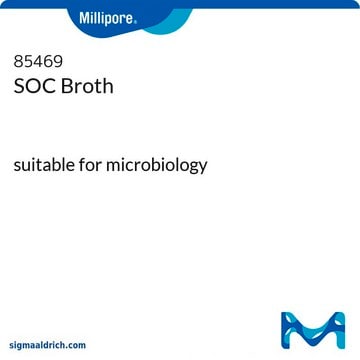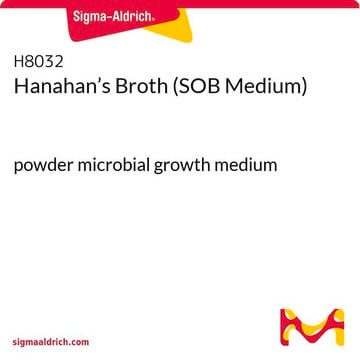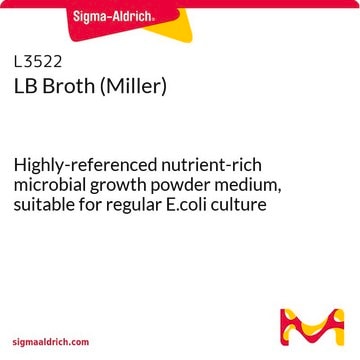S1797
SOC Medium
For use in transformation
Sinónimos:
Super Optimal broth
About This Item
Productos recomendados
grade
for molecular biology
sterility
0.2 μm filtered
form
liquid
composition
Dextrose, 3.603 g/L
KCl, 0.186 g/L
MgSO4, 4.8 g/L
Tryptone, 20 g/L
Yeast extract, 5 g/L
technique(s)
microbiological culture: suitable
application(s)
agriculture
storage temp.
2-8°C
suitability
nonselective for Escherichia coli
nonselective for coliforms
General description
Application
Features and Benefits
- Filter-sterilized, ready-to-use format
- Convenient package sizes
- Standard formulation
related product
Storage Class
12 - Non Combustible Liquids
wgk_germany
WGK 1
flash_point_f
Not applicable
flash_point_c
Not applicable
Certificados de análisis (COA)
Busque Certificados de análisis (COA) introduciendo el número de lote del producto. Los números de lote se encuentran en la etiqueta del producto después de las palabras «Lot» o «Batch»
¿Ya tiene este producto?
Encuentre la documentación para los productos que ha comprado recientemente en la Biblioteca de documentos.
Los clientes también vieron
Artículos
General protocols for growth of competent cells and their transformation (uptake of DNA).
General protocols for growth of competent cells and their transformation (uptake of DNA).
General protocols for growth of competent cells and their transformation (uptake of DNA).
General protocols for growth of competent cells and their transformation (uptake of DNA).
Protocolos
Technical Article on competent cells. Transformation is a process by which some bacteria take up foreign genetic material (naked DNA) from the environment.
Technical Article on competent cells. Transformation is a process by which some bacteria take up foreign genetic material (naked DNA) from the environment.
Technical Article on competent cells. Transformation is a process by which some bacteria take up foreign genetic material (naked DNA) from the environment.
Technical Article on competent cells. Transformation is a process by which some bacteria take up foreign genetic material (naked DNA) from the environment.
Nuestro equipo de científicos tiene experiencia en todas las áreas de investigación: Ciencias de la vida, Ciencia de los materiales, Síntesis química, Cromatografía, Analítica y muchas otras.
Póngase en contacto con el Servicio técnico












